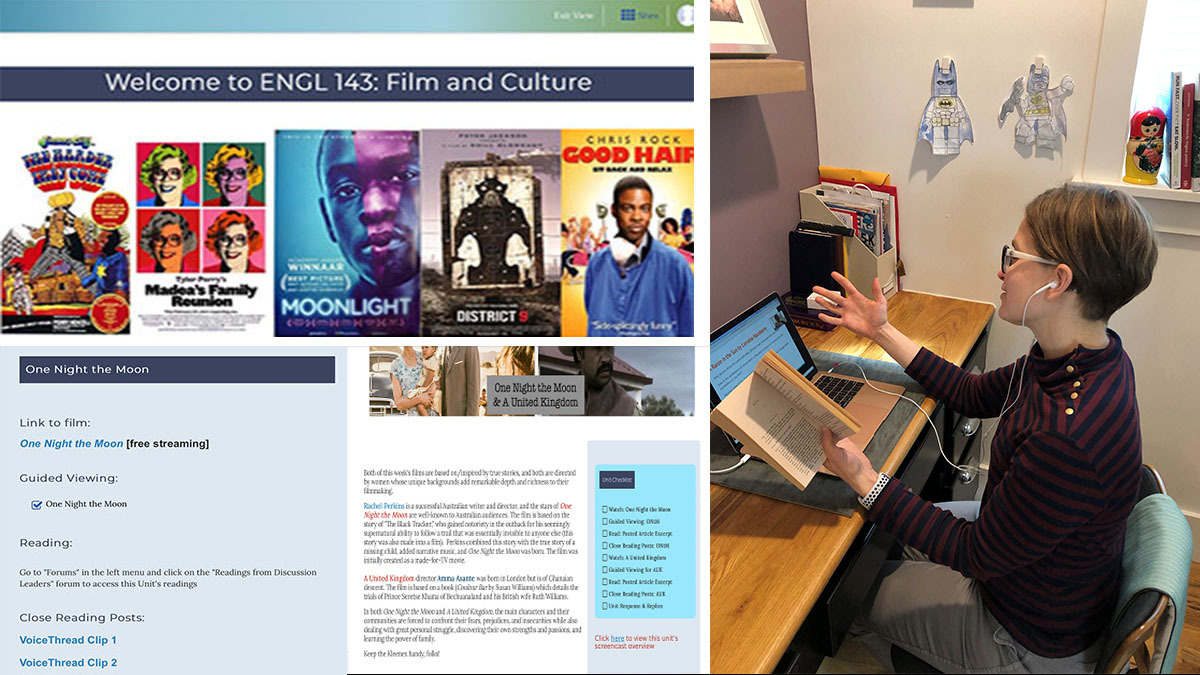Larson is using her experience teaching online courses to serve as a peer mentor to her colleagues during the University’s transition to remote learning.

Jennifer Larson
TEACHING ASSOCIATE PROFESSOR AND DIRECTOR OF UNDERGRADUATE STUDIES IN THE DEPARTMENT OF ENGLISH AND COMPARATIVE LITERATURE
12 years working at Carolina
What is your role in the department of English and comparative literature?
I’m a teaching associate professor and the director of undergraduate studies. Since the change to remote teaching, my responsibilities have shifted more to the student and faculty support aspects of these roles. I’ve been answering a lot of questions over email, as well as meeting with faculty via Zoom or phone to talk through questions about remote teaching. That said, we’re also still busy planning next year’s schedule and getting ready for course registration next month.
How have your courses transitioned to remote learning?
English 143 and English 381 were both primarily discussion based, both in class and in online discussion forums. The in-class discussions were often group focused, so in this transition I’ve amped up the online discussion forums and added Zoom sessions for group discussions and other active learning opportunities. I’m hoping to keep the class dynamic energetic and fun.
How is your home work space different from your office in Greenlaw Hall?
My home work space is a little office nook (that apparently looks a bit like a closet from the perspective of fellow Zoom attendees). The space hasn’t changed much since this all started; I’m just trying to keep it less cluttered since I’m spending so much more time in it. All I brought from Greenlaw was the stack of books for my class and my current research project. I was bummed when I realized last week that I had left my chocolate stash and my extra bottle of hand sanitizer in my desk drawer.
What has been the biggest challenge you’ve faced when transitioning to remote learning?
The biggest challenge is making sure I’m anticipating my students’ needs – because they didn’t sign up for an online course. They’re in evolving situations, so I’ve sent out a technology and resource survey to make sure they have everything they need, and I’m working with them to ensure that they feel confident about the class and are able to learn.
How is your department maintaining a sense of community?
Our online faculty meetings have been well attended and everyone is in good spirits. I’ve had some small group meetings over Zoom to help colleagues practice using the software, and it’s been a great opportunity to have conversations with peers like we normally would in the halls of Greenlaw. The English department has been taking advantage of the technology available and working to maintain connections with each other, whether that’s to reach out for help or just have a coffee over Zoom.
You volunteer as a peer mentor as part of the department of English and comparative literature’s transition leadership team. What made you want to volunteer?
I have taught remotely in various formats over the years, and most recently I taught summer school courses online. Online learning is a real passion of mine, as well as a research area, so I know there’s a lot of potential for effective online teaching. I’ve taught English 143 online before, and I found that while at first it was an overwhelming experience to migrate a face-to-face class online, it helped me rethink my class and assess how I teach. In an online format, I’ve found that student discussions and comments can be more detailed and robust because the students have time to think through their answers without the pressure of an entire class looking at them. The silver lining of transitioning to online learning is that this an opportunity to foster learning in fresh and innovative ways.
How have you helped your colleagues as a peer mentor?
I worked with the UNC Writing Program to create a resource guide to answer common questions, and I recorded some short videos on topics like “How to do a close reading” and “How to lead a peer review workshop on Sakai.” I’ve also been pairing up department faculty who said they would like to mentor with those who expressed interest in one-on-one assistance. Overall, I’ve just been trying to help where I can and make myself available to my colleagues however they may need me.
By Madeline Pace, The Well
